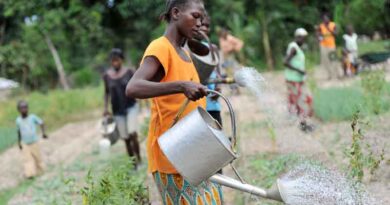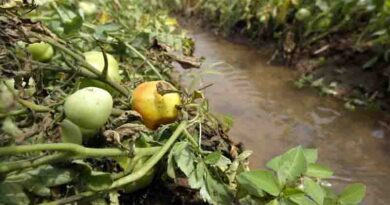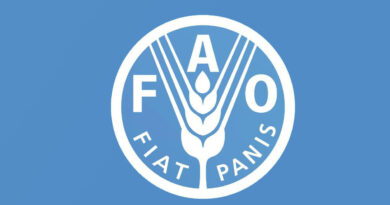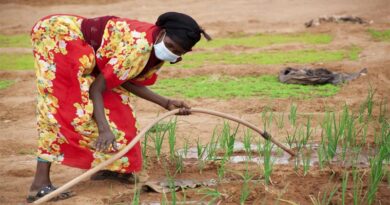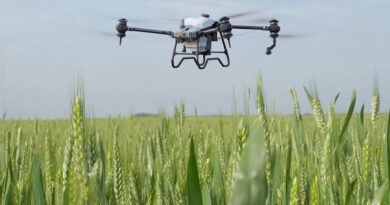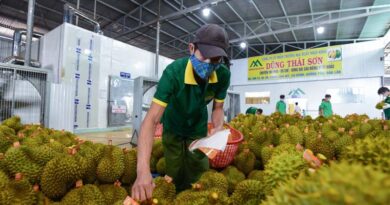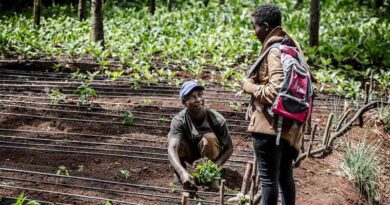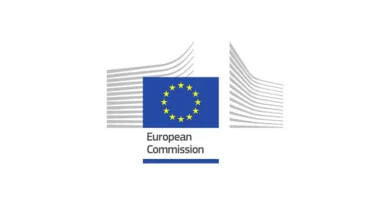Rome Water Dialogue 2023 seeks solutions and synergies and brings practical contributions
04 October 2023, Rome: The Food and Agriculture Organization of the United Nations (FAO) today opened a key gathering aimed at finding synergies and solutions to water’s critical role relating to soils, land, climate change, biodiversity and agriculture, and also showcasing practical contributions to making better use of our finite freshwater resources.
“We must stop taking water for granted,” FAO Director-General QU Dongyu said as he opened the two-day Rome Water Dialogue, the second of its kind and the latest in a series of water-related events and commitments of FAO. With agriculture accounting for more than 70 per cent of the planet’s freshwater withdrawals, “by increasing efficiency, reducing negative impacts and reusing wastewater, agriculture holds the solutions to the global water crisis, as well as the key to achieving global water and food security,” Qu said.
The FAO Director-General further emphasized the need for a 4Rs approach based on the principles of Reduce, Reuse, Recycle and Replace, to effectively address the severe water challenges mostly due to water related natural disasters that resulted in direct economic costs of more than USD 200 billion in 2021 alone.
The dialogue forms part of what FAO brands its Water Journey, a focus on integrated water resource management for agricultural and food security. Starting with the first Rome Water Dialogue last year, milestones include the Africa Regional Workshop on National Water Roadmaps hosted by Zimbabwe, the second WASAG International Forum and the Praia Call for Action, the designation of water as the theme of the FAO Conference last July, of the next biennium and of this year’s World Food Day on 16 October. It also features eight commitments by FAO towards the Global Water Action Agenda as adopted during the UN 2023 Water Conference to achieving the water-related goals outlined in the 2030 Agenda and the Sustainable Development Goals.
High level participants in this year’s Dialogue include Sulton Rakhimzoda, Special Envoy of the President of the Republic of Tajikistan for Water and Climate, Mohamed Abdel Vetah, High commissioner of the Senegal River Basin Development Organization (OMVS), Meike van Ginneken, Water Envoy of the Kingdom of the Netherlands and Astrid Schomacker, Director Green Diplomacy & Multilateralism at the European Commission.
FAO practical support
FAO’s practical support to countries includes: technical solutions on rainwater harvesting and storage, aquifer storage and recovery, non-conventional water resources for agriculture, irrigation systems and fish passages.
The Organization also works with countries to map out irrigation needs and potential in support of planning, investment and financing decisions. Additionally, it supports countries with data, information, through platforms such as FAO’s Water Productivity Open-access of Remotely sensed derived data (WaPOR) – the geographical scope of which is just expanded to cover the entire globe - and the Global Framework on Water Scarcity in Agriculture (WASAG).
To consolidate information and insights, FAO is also working on a global assessment on the impact of floods on agriculture and rural areas. In supporting countries to accelerate the implementation of the 2030 Agenda, FAO is providing financial and technical assistance to develop National Water Roadmaps to help ensure sustainable water management.
Soil and water exchanges
The Dialogue includes eight technical sessions and a joint reporting and closing ceremony with the “Global Symposium on Soils and Water” which is being held concurrently, enabling technical exchange among participants of the two events.
“We – the global community – must leverage every opportunity to achieve a resilient, sustainable water secure, food secure future”, the FAO Director-General said.
In practical terms, this year’s Rome Water Dialogue will also see the expansion of the WaPOR database, FAO’s portal to monitor Water Productivity through Open access of Remotely sensed derived data, which is currently only available in certain regions, but will now go global. The new version 3.0 provides global coverage at 300 m resolution and the use of improved data and processing.
The WaPOR portal, with support from The Kingdom of the Netherlands, has been providing users with near real time data (every 10 days) since 2017. Data on water productivity and other related variables lend themselves to a variety of uses such as irrigation scheduling advice for farmers, monitoring and improving agricultural production, water accounting, irrigation performance assessment, drought monitoring and assistance for transhumance, among others.
Water quality risks
Also to be launched on the second and final day of the Rome Water Dialogue is the publication by FAO and the International Water Management Institute (IWMI) of a report examining “Water quality in agriculture: Risks and risk mitigation”. It offers insights aimed at addressing water quality risks at a time when a significant volume of water, used both domestically and in agriculture, remains untreated, fostering potential health hazards, particularly in regions with limited healthcare infrastructure.
Key facts and figures
- Currently 2.4 billion people live in water-stressed countries, and approximately 10 percent of the global population live in countries with high and critical water stress. These impacts disproportionately affect women and girls, making water an equity issue.
- Global water demand for agriculture is expected to increase by 35 percent by 2050.
- Over 80 percent of wastewater is released to the environment without being treated or reused.
- Limiting global warming to 1.5 degrees Celsius, compared to 2 degrees Celsius, will benefit water resources and reduce water stress induced by climate change.
- Almost 1 billion tonnes of food – 17 percent of all food available to consumers worldwide – is thrown away each year, resulting in the waste of precious resources, such as water, that were used to produce it.
- 95 percent of our food is produced on land and it all begins with soil and water.
(For Latest Agriculture News & Updates, follow Krishak Jagat on Google News)


